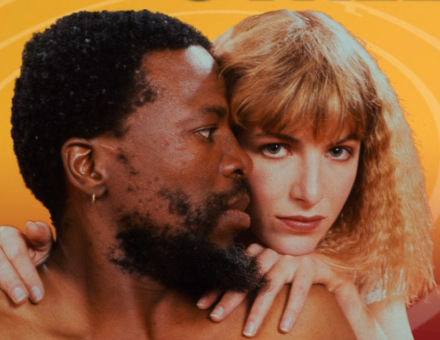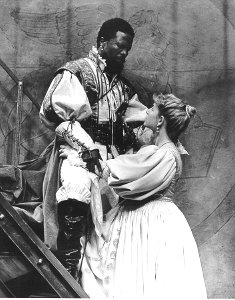When John Kani was asked to play Othello in an apartheid South Africa, his heart started thumping because he knew how much trouble he was in for.
Shakespeare’s Othello tackles racis, and one can only imagine what it was like for Kani who was about to breach South Africa’s then colour bar by being the first black South African actor to play Othello at the peak of apartheid.
He had accepted the lead role in the play that became the directing debut of Janet Suzman, a South African actress and longtime friend who last worked with him in the 1970s in Edward Albee’s ”Death of Bessie Smith.”
The year was 1987, and production photos of “Othello’s” interracial intimacy in the drama started appearing on the pages of South African newspapers, causing a stir across the country.

Two years prior, interracial marriage and interracial sex were outlawed in South Africa. The laws were repealed, but segregated schools and residential areas were still making life difficult for mixed couples at the time.
It was against this backdrop that Kani made the decision to be the lead actor in a production that focused on the destruction of an interracial marriage.
Coming from Soweto, the largest township in southern Africa, Kani was one of the top actors in South Africa, having won a 1976 Tony Award for his Broadway role in Athol Fugard’s ”Sizwe Banzi Is Dead”.
Apartheid had affected him and his family, as one of his brothers, Xolile, was killed by the police during the 1985 unrest. Another brother had in 1962 been sentenced to five years in prison after being convicted of furthering the aims of the outlawed African National Congress. Thus, accepting to play Othello in a multi-racial love affair with the fair-skinned actress, Joanna Weinberg, was seen by many as an act of courage.
In fact, not too long ago, Kani would not have had the chance to kiss a white actress full on the mouth without causing a national debate and demonstrations by white supremacists, reports the Washington Post.
He had once appeared in Strindberg’s “Miss Julie”, where half of the audience walked out as he put his hand on the thigh of the white actress in the play. Kani even had to seek police protection in order to leave the theatre safely before the government eventually cancelled the play.
Nevertheless, Kani liked his new Shakespearean role because he considered himself as both an artist and an activist and was always willing to work on projects that were politically relevant.
Both he and Suzman believed that the drama had an important message for South Africans.
”It brings into focus what is going on now – the reluctance of people in this country to accept each other on the basis of the fact that they do not share the same pigmentation,” Kani said.

Rehearsals for the play, which was to be held at the Market Theater, the venue for protest theatre and multiracial drama in South Africa, were ‘painstaking’.
“The first run-through of the play was postponed because police cordoned off Soweto in preparation for the funeral of a murdered activist. Police roadblocks were a constant challenge to Kani as he made his way from Soweto to the Market Theatre in downtown Johannesburg,” according to a journal article, “Othello at the Market Theatre.”
However, Othello, starring a Xhosa man was a form of protest theatre in apartheid South Africa, so Kani was all ready for it. During the five-week run, audiences averaging 40 per cent black flocked to the downtown venue to see Shakespeare’s classic, reports Chicago Tribune.
The journal article published by The Johns Hopkins University Press writes that this “collapse of aesthetic distance” invited black and white audience members alike in 1987 South Africa to consider their own complicities in fantasies surrounding miscegenation and violence.”
Despite the successes, the production was a nuisance for some people. It has been documented that scores of people walked out of the theatre when Othello and Desdemona, played by Weinberg, first kissed.

Suzman further indicated that by the time the production closed, she had received ”hate mail” from part of the audience and even from people who had not seen the play
Suzman, a South African actress who helped found the Market Theater, lived in London but paid regular visits to her parents in Johannesburg. She suggested the production of Othello to Kani when she met him at the Market during one of her visits.
Kani, who was around 43 then, had grown up as the son of a policeman who had difficulties in raising his 11 children. While working on the assembly line at the Ford Motor Company plant in Port Elizabeth, Kani joined a drama group – the Serpant Players and would later star in most of their plays
These were followed by the more famous Sizwe Banzi is Dead and The Island, co-written with Athol Fugard and Winston Ntshona, in the early 1970s.

Kani further received an Olivier Award nomination for his role in My Children! My Africa! His work has been widely performed around the world, including New York, where he won the Tony Award in 1975 for Sizwe Banzi Is Dead.
In 2016 Kani received the national honour of the Order of Ikhamanga in Silver, for his “excellent contributions to theatre and, through this, the struggle for a non-racial, non-sexist and democratic South Africa.”
The main theatre of the Market Theatre complex in Newtown, Johannesburg, has been renamed The John Kani Theatre in his honour.
The actor, director and playwright










